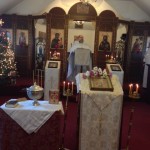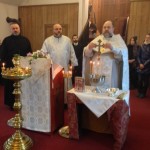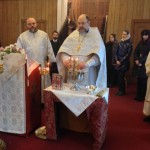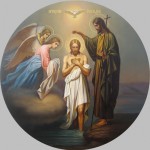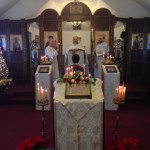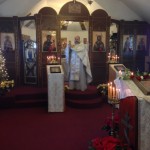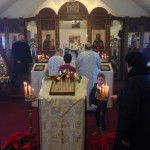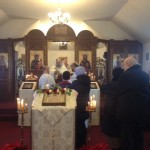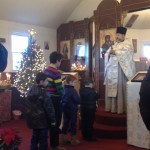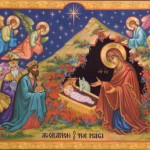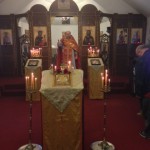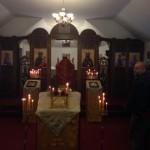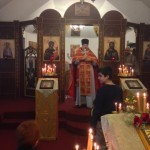On January 26, on the Sunday after Theophany we had a liturgical celebration in our temple. St. George’s Rector, Archpriest Igor Tarasov served the Divine Liturgy.
Following the readings from the Scripture the Rector preached a homily:
“The Epistle lesson we heard today is again reminding us about the grace of God. We reflected upon that on the feast of the Theophany referring to the Communion hymn of the feast: “The grace of God that brings salvation has appeared to all men” which is taken from the Epistle of St. Paul to Titus read on that holy day (Tit. 2, 11). So, today we have an opportunity to reflect more about the divine grace.”
“St. Paul says that “to each one of us grace was given according to the measure of Christ’s gift” (Eph. 4, 7). Grace is a gift bestowed upon us from the abundant riches of our Lord. But St. Paul says that Jesus Christ acquired those riches through His endeavors. He became man, He condescended to our nature, He suffered for our sake, He died for us on the cross. For these heroic labors Jesus was awarded the riches of God’s graces and Himself, being God, can bestow those gifts upon men. To describe that St. Paul in today’s Epistle recalls the words of the David’s Psalm: “When He ascended on high, He led captive, and gave gifts to men” (Ps. 67, 18; Eph. 4, 8). And then St. Paul explains that “He ascended” means that Jesus first descended into our world. In addition, after His death, He descended into the tomb and to Hades. Because of that that Jesus conquered death by death. By His death He could raise from the dead and by His descending He could ascend into heaven. Thus, through the endeavors of Jesus we may be given His abundant grace.”
“Our Lord ascended into heaven and then sent the Holy Spirit upon His followers. The Holy Spirit could also descend into our world, but only after Jesus’ Ascension into heaven. The Holy Spirit is the Source of the divine grace, He is the Treasury of good things and Giver of life, as we call Him in our prayers. He gives different gifts to the members of the Church. St. Paul in today’s Epistle reading says that the Lord “gave some to be apostles, some prophets, some evangelists, and some pastors and teachers” (Eph. 4, 11). The Church needs different talents, different ministries. And unity of the Church does not mean uniformity. This is why the Lord bestows different gifts on different faithful. All these gifts serve to strengthen the Church, to build the Body of Christ on earth. The grace and gifts of the Holy Spirit make the Church alive and powerful. As St. Paul says it serves “for the equipping of the Saints for the work of ministry, for the edifying of the Body of Christ” (Eph. 4, 12).”
“Here we should add that those gifts of the Holy Spirit are especially expected to be given through the grace received in the holy Sacrament of Chrismation. These days when we celebrate Baptism of the Lord, we recall our own Baptism, the Sacrament which is necessary for salvation. But we have already said before that Baptism is only the beginning of personal salvation. The next step in that path is to receive the Mystery of Chrismation, the seal of the Holy Spirit. In our pious tradition this Sacrament is given along with Baptism, as a following part of the same ceremony. Thus a baptized person very soon acquires special and additional grace of the Holy Spirit enabling him or her to become blessed by the rich divine gifts.”
“Holy Baptism and holy Chrismation are the first steps of salvation, the first important events in our Christian life. But we are called not to stop at those steps, not remain satisfied with accomplishing only them. We need to grow in grace, to acquire the further knowledge of God. St. Paul finishes today’s Epistle lesson saying that we need to “come to a perfect man, to the measure of the stature of the fullness of Christ” (Eph. 4, 13). Thus we need to grow and mature in Christ. “Grow in the grace and knowledge of our Lord and Savior Jesus Christ”, says St. Peter (2 Pet. 3, 18). Unfortunately, some people do not do that. Some stop at Baptism and Chrismation, some after finishing Sunday school. Some people get baptized and chrismated when they are little children or even older people, and later do not go to the church, do not receive other Mysteries. It is sad, because such people do not grow up spiritually. They stop at the stage of early childhood. They may consider themselves Orthodox and sometimes they are proud about that, but they do not live a true Christian life. Others could go to the church while being children. Their parents brought them to the temple, so they received Communion, participated in the holy services. If a parish had a Sunday school, they attended it and learned about their faith. But when they grew up and became independent, they left the Church. It is very sad. It is a pain of many today’s Orthodox parents. Their children stopped in growing in grace when they finished their young years or Sunday school.”
“This reminds of a situation when a scientist, an astronomer was in a company with a high school student. The student found out that the person is an astronomer and said, “Oh, an astronomer? I finished Astronomy last year”. In the same way many people finished their religion, their Orthodoxy when they finished Sunday school. They stopped at the level of children while St. Paul calls us to grow in faith, to come to a perfect man, to the measure of the stature of the fullness of Christ (Eph. 4, 13).”
“Dear brothers and sisters! Let us be grateful the Lord for His abundant grace given to us in the Church. Let us appreciate our gifts of Baptism and Chrismation, along with other holy Mysteries in which we acquire the grace. But let us grow and mature in that grace all our life. May the Holy Spirit guide us that we may grow more and more unto a Perfect Man, our Lord Jesus Christ!”
After the Liturgy dismissal Fr. Igor reminded parishioners to make arrangements if they wish him to visit their homes with holy water.
Following the service our Rector and parishioners enjoyed delicious meals at the coffee hour. At that point Hieromonk Zosimas (Krampis), the former parish Rector paid a short visit to our church, and we were happy to welcome him at the table.

